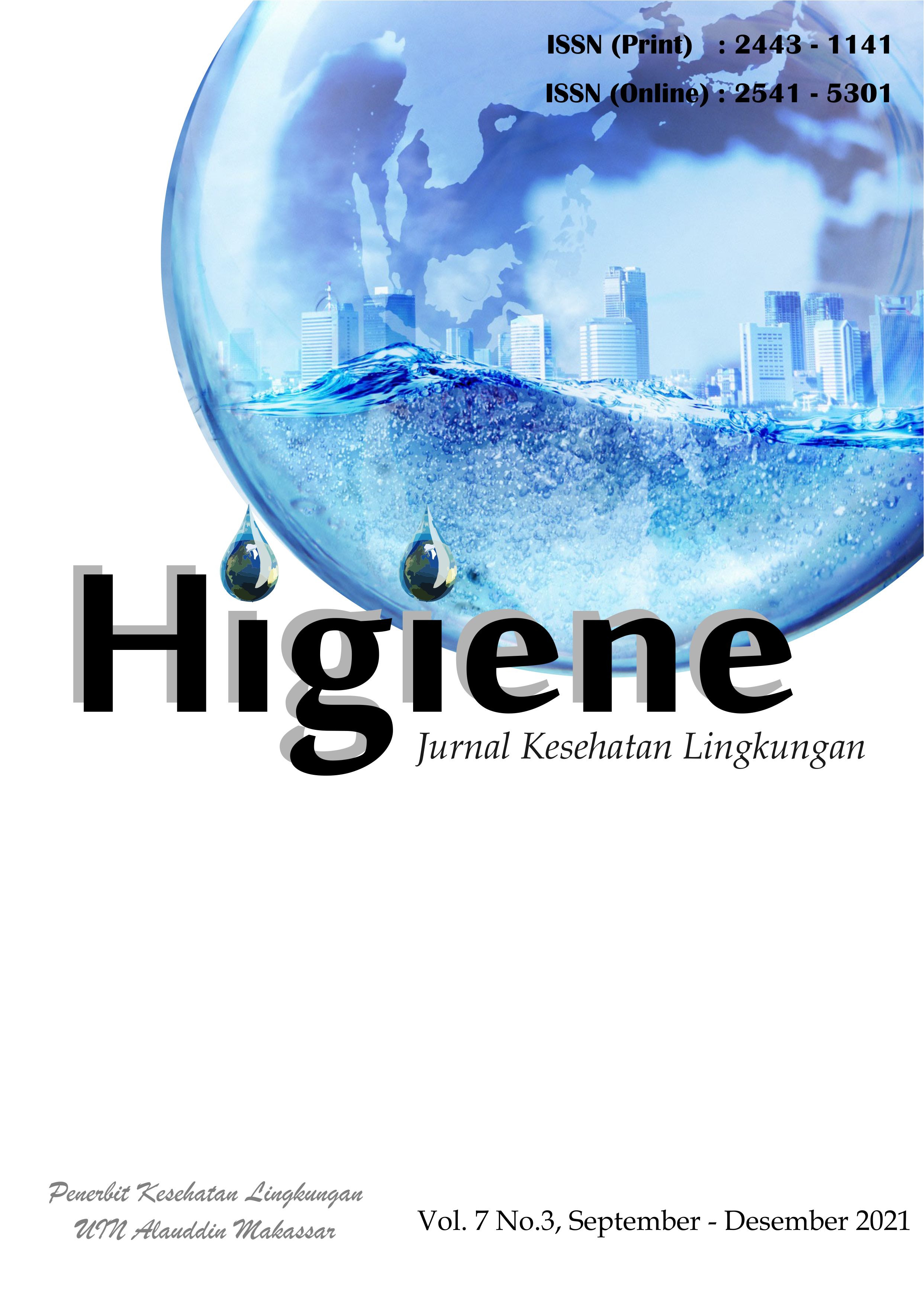Analisis Tata Kelola Sanitasi Lingkungan Pasar Rakyat Menuju Pasar Sehat Era New Normal Di Kota Yogyakarta
Abstract
A healthy market is a clean, safe, comfortable, and healthy market condition through the fulfillment of environmental quality standards, health requirements, as well as supporting facilities and infrastructure with the independence of the market community. Markets that have poor environmental sanitation management will have an impact on public health, especially when the new normal is enacted. This study aims to analyze the environmental sanitation management of the market in the new normal at the market in the city of Yogyakarta based on the Minister of Health Regulation No. 17 of 2020 concerning healthy markets and the Decree of the Minister of Health through KMK No. HK.01.07-MENKES-382-2020 concerning Public Health Protocols in Public Places and Facilities in the Context of Preventing COVID-19. This research is a descriptive observational study by placing the sample in the study using stratified random sampling, which is selected based on the qualifications of the market class I to class V located in the city of Yogyakarta and under the supervision of the Yogyakarta City Trade Office. Class I is represented by Beringharjo Market (eastern), class II Giwangan Market, class III Demangan Market, class IV Pasar Legi Patangpuluhan and class V Pasar Gedong Kuning. The results obtained are three markets that are categorized as healthy markets in a relaxed manner in the new normal era, namely East Bringharjo Market, Legi Patangpuluhan Market, and Gedong Kuning Market.
References
Athena, Laelasari, E. dan Puspita, T. (2020) “Pelaksanaan Disinfeksi dalam Pencegahan Penularan Covid- 19 dan Potensi Risiko terhadap Kesehatan di Indonesia,” Jurnal Ekologi Kesehatan, 19(1), hal. 1–20.
Badan Pusat Statistika, 2020, Direktori Pasar dan Pusat Perdagangan 2020, Badan Pusat Statistika, Jakarta.
Databoks, “Pasar Jadi Lokasi Orang Belum Patuh Protokol Kesehatan Terbanyak”, https://databoks.katadata.co.id/datapublish/2021/04/16/pasar-jadi-lokasi-orang-belum-patuh-protokol-kesehatan-terbanyak#, diakses 29 Mei 2021.
Ekong, I. L., 2013, An Assessment of Environmental Sanitation in an Urban Community of Southern Nigeria, African Journal of Environmental Science and Technology, Vol. 9(7).
Gusti, A. dan Sari, P. N., 2020, Environmental Sanitation of Traditional Market in Padang and Payakumbuh, International Journal of Applied Engineering Research, Volume 15(3).
Hamdani, Parman dan Inna, N., 2019, Analisis Penyelenggaraan Pasar Sehat TAC Kota Jambi Tahun 2019, Scientia Journal, Vol. 8(1).
Haque, S. et al. (2021) “Coronavirus disease 2019 (COVID-19) induced waste scenario: A short overview,” Journal of Environmental Chemical Engineering, 9, hal. 1–14.
Kahfi, A. (2017) “Tinjauan Terhadap Pengelolaan Sampah,” Jurisprudentie, 4(1), hal. 12–25. doi: 10.24252/jurisprudentie.v4i1.3661.
Kementerian Kesehatan Republik Indonesia, 2020, Peraturan Menteri Kesehatan Republik Indonesia Nomor 17 Tahun 2020 Tentang Pasar Sehat, Kemenkes, Jakarta.
Kementrian Kesehatan Republik Indonesia, 2020, Keputusan Menteri Kesehatan melalui KMK No. HK.01.07-MENKES-382-2020 tentang Protokol Kesehatan Bagi Masyarakat di Tempat dan Fasilitas Umum Dalam Rangka Pencegahan COVID-19, Kemenkes, Jakarta.
Kementerian Kesehatan Republik Indonesia, 2008, Peraturan Menteri Kesehatan Nomor 519/MENKES/SK/VI/2008 Tentang Pedoman Penyelenggaraan Pasar Sehat, Jakarta.
Livingston, J. (2021) “Water Scarcity & Health in Urban Africa,” Daedalus, 150(4), hal. 85–102. doi: 10.1162/daed_a_01874.
Marisa, P. S., Yulianti, A. E. dan Rusminingsih, N. K. (2021) “Gambaran Keadaan Fasilitas Sanitasi Di Pasar Kreneng Desa Dangin Puri Kangin Kecamatan Denpasar Utara Tahun 2021,” Jurnal Kesehatan Lingkungan, 11(1), hal. 27–36.
Mulyatna, L., Wilantri, R. N., Yustiani, Y. M., 2021, Evaluation on The Sanitation Facilities in The Gegerkalong Traditional Market, Bandung, Indonesia, IOP Conf. Series: Earth and Environmental Science 737. doi:10.1088/1755-1315/737/1/012072
Nopitrisari, D. dan Ardillah, Y. (2021) “Gambaran Kondisi Fasilitas Sanitasi Pasar dan Perilaku Hidup Bersih dan Sehat Pedagang di Desa Randik pada Masa Pandemi Covid-19,” Jurnal Kesehatan, 20(2), hal. 282–292.
Nurcahya, K., Moelyaningrum, A. D. dan Ningrum, P. T., 2014, Identifikasi Sanitasi Pasar di Kabupaten Jember (Studi di Pasar Tanjung Jember), e-Jurnal Pustaka Kesehatan, Vol. 2(2).
Sulistyo, H. dan Cahyono, B., 2010, Model Pengembangan Pasar Tradisional menuju Pasar Sehat Di Kota Semarang, Jurnal Ekobis, Vol. 11(2).
Sukresno, H., Hakim, A., Wike dan Afandhi, A., 2019, Evaluation of Solid Waste Management Regulation in Minulyo Traditional Market, Pacitan Regency, Indonesia, International Journal of Civil Engineering and Technology, Vol. 10(5).
WHO (2020) Water, sanitation, hygiene, and waste management for SARS-CoV-2, the virus that causes COVID-19, Interim guidance. Tersedia pada: https://www.who.int/publications/i/item/water-sanitation-hygiene-and-waste-management-for-the-covid-19-virus-interim-guidance.
World Health Organization (WHO) dan United Nations Children’s Fund (UNICEF) (2019) “Implications of recent WASH and nutrition studies for WASH policy and practice,” hal. 1–8.
Copyright (c) 2021 HIGIENE: Jurnal Kesehatan Lingkungan

This work is licensed under a Creative Commons Attribution 4.0 International License.


